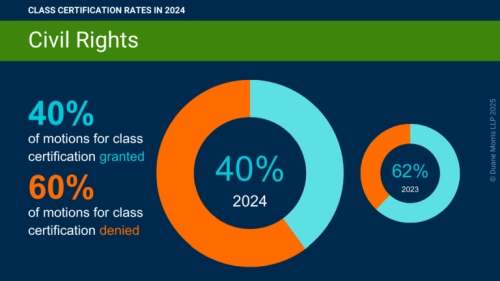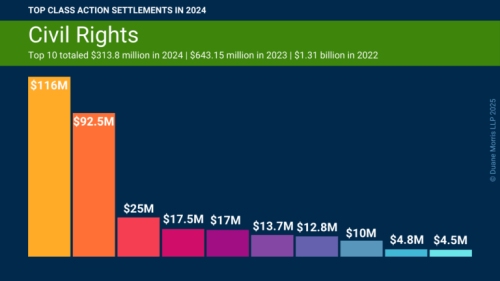Duane Morris Takeaway: This week's episode of the Class Action Weekly Wire features Duane Morris partner Jennifer Riley and associate Nathan Norimoto discussing the key developments in civil rights class actions, including a notable ruling from the U.S. Supreme Court.
Check out today's episode and subscribe to our show from your preferred podcast platform: Spotify, Amazon Music, Apple Podcasts, Samsung Podcasts, Podcast Index, Tune In, Listen Notes, iHeartRadio, Deezer, and YouTube.
Episode Transcript
Jennifer Riley: Hello, everyone, and thank you for being here again for the next episode of our weekly, podcast the Class Action Weekly Wire. I'm Jennifer Riley, partner at Duane Morris, and joining me today is Nathan Norimoto. Thank you, Nathan, for being on the podcast today.
Nathan Norimoto: Thank you, Jen. Great to be here.
Jennifer: Today, we wanted to discuss some trends and important developments in the area of civil rights class action litigation. Nathan, do you want to talk a bit about this area before we get into the recent developments?
Nathan: Sure. Yeah, so for over 70 years, class actions have been amongst the most powerful tools to secure civil rights in America. This began with the class action of Brown, et al. v. Board Of Education, in which the United States Supreme Court declared school segregation unlawful and arguably set the stage for the civil rights movement. In 1966, Congress and the judicial rule-making authorities crafted Federal Rule of Civil Procedure Rule 23 with the express goal of empowering litigants, challenging systematic discrimination – particularly segregation – to force courts to order widespread injunctive relief that would protect members of the class as a whole. And ever since, this provision remains as salient to the enforcement of federal civil rights statutes and constitutional claims as it was at its inception.
So, for a multitude of reasons, class actions are often a tool of first resort by advocacy groups to remedy civil rights violations – which we certainly saw in 2024.
Jennifer: Thanks, Nathan. What were some of those major developments in 2024 in this area of civil rights class action litigation?
Nathan: So, class actions in the civil rights context span numerous issues. Last year, given this breadth of subject area, there are well over 100 decisions in this space. However, the percentage of times courts granted a plaintiff's or plaintiffs' motion for class certification was down significantly last year, with courts granting certification about 40% of the time – in contrast to 2023, where courts granted class certification around 62% of the time. And so last year we saw a bit of a downtrend as to when these classes were being certified.

Jennifer: Are there any key rulings that our listeners need to know about in this area?
Nathan: So, among all civil rights cases, the United States Supreme Court issued an important ruling in the City Of Grants Pass, Oregon, et al. v. Johnson. In that case, the Supreme Court addressed whether a city's public camping laws violated the Eighth Amendment's prohibition against cruel and unusual punishment. Grants Pass, Oregon had ordinances banning camping on public property which can lead to fines and imprisonment. The Ninth Circuit had previously ruled that such laws could not be enforced against homelessness if there were not enough shelter beds available. The plaintiffs, two individuals experiencing homelessness, had filed a class action alleging that Grants Pass' enforcement of these laws was unconstitutional under the Eighth Amendment. The district court agreed with the plaintiffs and issued an injunction against the city's enforcement of the public camping laws, and then the Ninth Circuit affirmed the district court's ruling. The United States Supreme Court then granted certiorari, and it overruled the Ninth Circuit's decision. The Supreme Court determined that enforcing general public camping laws does not violate the Eighth Amendment. The court opined that the Eighth Amendment's cruel and unusual punishment clause focuses on the nature of the punishments and not the criminalization of certain behaviors. And so, the court found that the punishments of fines and brief jail time terms imposed by grants passed were not cruel or unusual under the Eighth Amendment. The court also rejected arguments that the enforcement of these laws against individuals who are involuntarily homeless should be considered cruel and unusual, and in the end the court concluded that issues like homelessness and how to address homelessness involved complex policy decisions that were best left for elected representatives and not federal courts to address. So, in conclusion, the court overruled the Ninth Circuit's ruling, finding that the enforcement of public camping laws by Grants Pass did not violate the Eighth Amendment.
Jennifer: Wow, what an interesting decision. So, you mentioned that there were over a hundred rulings in this area last year. How are things progressing so far in 2025 – have there been any interesting cases, interesting rulings where class certification was granted?
Nathan: Definitely, yeah. So, one example is Rossow, et al. v. Jeppesen. In that case, the plaintiff filed a punitive class action against the defendant, the Director of the Idaho Department of Health and Welfare, challenging a regulation that designated the prenatal use of controlled substances as child abuse, neglect, or abandonment – with the exception, of course, being that any substances that were prescribed by medical professional would not fall under this regulation. The regulation also included a clause that mandated individuals who use controlled substances be listed on the Central Registry for a minimum of ten years, and the plaintiff in this case was placed on the registry in December of 2021 after she tested positive for THC following the birth of her child. The plaintiff filed a class action, alleging violations of due process and equal protection under the United States Constitution on behalf of herself and others in similarly situated positions. Plaintiff filed a motion for class certification, and the court granted the motion. The court had found that the class met the numerosity requirement, as there were over 1,000 women on the registry for a similar reason as the plaintiff. The court also determined that the plaintiff's claim raised common questions of law and fact, including whether the placement on the Central Registry affected a class member's access to employment and their other personal rights, substantive rights, and whether there was a discriminatory intent, and how reports of child abuse were substantiated based on prenatal drug use. There were some procedural details and statute of limitations differences between the class members. But despite these differences, the court found that commonality was met because the class shared at least one significant common issue, including being placed on the registry. The court determined that the plaintiff's claims for declaratory and injunctive relief met the requirements under Rule 23, and ultimately certified the class.
Jennifer: Well, it certainly seems like we will be continuing to see courts granting these motions in 2025, and the plaintiffs' bar aggressively pursuing certification on behalf of plaintiffs. We know that successful certification often leads to settlements between the parties rather than a continuation of the litigation and ultimately a trial. So, how successful were plaintiffs in securing settlement dollars in 2024?
Nathan: So, settlement dollars in civil rights class actions in 2024 were significant. The top 10 settlements totaled $313.8 million. However, this was a significant decrease from the prior year, when the top 10 civil rights class action settlements in 2023 topped $643.15 million.

Jennifer: Wow, what a difference! So, the top settlement amounts in each area of law have been massive in recent years. And that's a major trend that we track in the Duane Morris Class Action Review. We will continue to track those numbers in 2025 and keep our listeners aware of developments. Nathan, is there anything else corporate counsel and employers should be on the lookout for over the upcoming year?
Nathan: Definitely. Given the volume of litigation in the civil rights area, as well as the frequency with which these classes are granted, and also burgeoning issues that percolate, for example, claims regarding COVID-19, claims regarding increased issues with homelessness, and others, it's anticipated that the plaintiffs' bar will continue to be creative and inventive in this space for the coming year.
Jennifer: Well, thank you so much for all of your great analysis, Nathan – thank you for being here with me today. Listeners, thank you for tuning in. And if you have any questions or comments on today's podcast, please send us a DM on Twitter @DMClassAction.
Nathan: Thanks, Jen. Thanks for having me on this morning!
Disclaimer: This Alert has been prepared and published for informational purposes only and is not offered, nor should be construed, as legal advice. For more information, please see the firm's full disclaimer.


